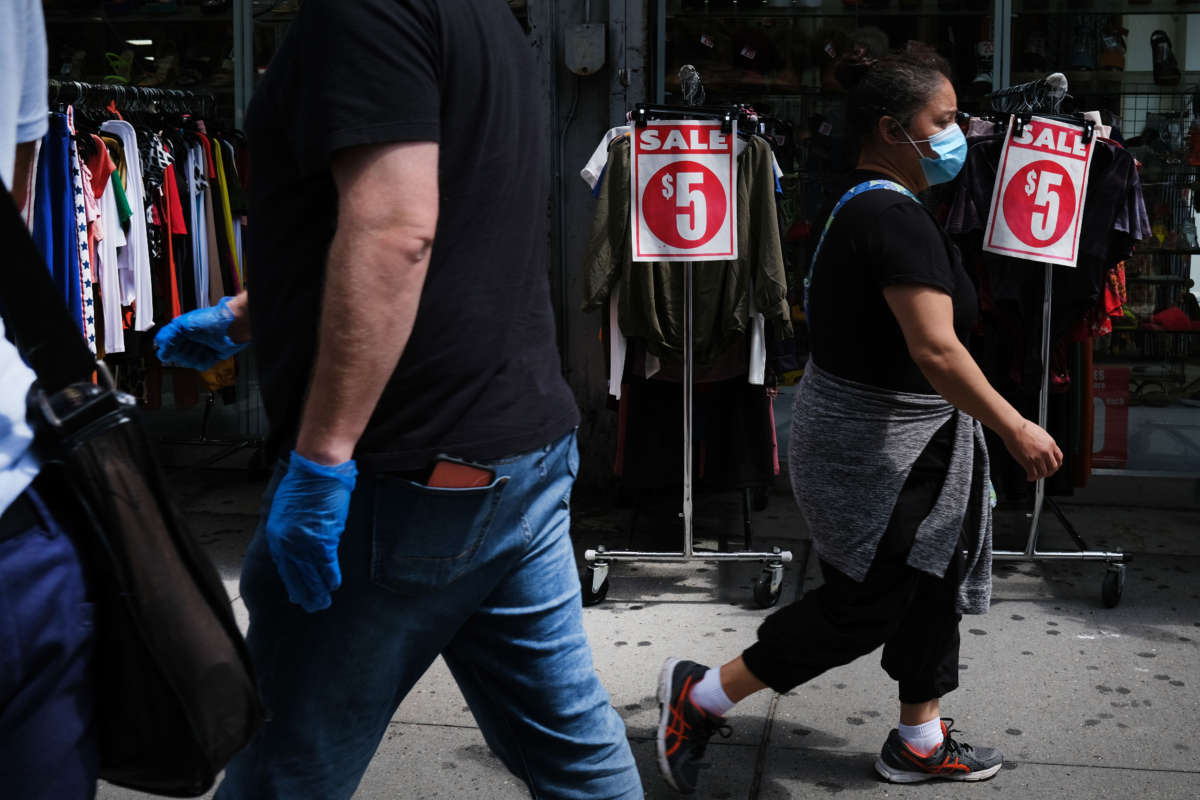Did you know that Truthout is a nonprofit and independently funded by readers like you? If you value what we do, please support our work with a donation.
The July employment report showed the economy adding another 1,761,000 jobs in July. This follows gains of 2,725,000 in May, and 4,791,000 in June, leaving the economy down 12,881,000 jobs from its February level.
The unemployment rate fell from 11.1 percent to 10.2 percent, while the employment to population ratio (EPOP) rose from 54.6 percent to 55.1 percent. These gains likely overstate the true improvement from June, since the Bureau of Labor Statistics has largely fixed a misclassification problem that had caused unemployed workers to be counted as employed. The EPOP is still down by 6.0 percentage points from February, which translates into 15.6 million fewer people being employed.
While most sectors added jobs, the leisure and hospitality sector accounted for a hugely disproportionate share of the gains. The 592,000 new jobs in the sector were 41.6 percent of the private sector job growth in the month. This corresponds to hotels and restaurants reopening as state and local governments rolled back restrictions. (It is important to remember that the pay period including July 12th is the reference point for this report, so it would not pick up the effect of new restrictions imposed in the last three weeks.) Even with this job gain, employment in the sector is still down by 4,340,000, or 25.7 percent, from the February level.
It is worth noting that the loss of jobs in this low-paying sector does not appear to be due to being discouraged from working by generous unemployment benefits. The average hourly wage for production workers in the sector fell by 0.2 percent in July. It fell by 3.4 percent for production workers in retail, and 0.4 percent for production workers overall.
Other sectors with large gains include retail (258,300), health care (191,400), and temporary employment (143,700). The government sector added 301,000 jobs with 215,100 of these being in local education. This is primarily a seasonal adjustment issue, as teachers normally are laid off in July, but this year they were laid off with the shutdowns in March and April. State and local employment is still down 1,170,000 from its February level. Manufacturing added 26,000 jobs, and construction added 20,000. Employment in both sectors is now 5.8 percent below the February level.
Several sectors continue to lose jobs. The publishing industry lost another 6,900 jobs, leaving employment 4.2 percent below year-ago levels. The motion picture industry lost 4,200 jobs. Employment is now 52.4 percent below year-ago levels. Mining lost 7,000 jobs, and employment in the sector is now at its lowest level since August of 2005.
One item worth noting is that the job losses in this downturn have been disproportionately among production and nonsupervisory workers. While 11.4 percent of production jobs have been lost since February, just 3.6 percent of supervisory positions have disappeared.
The picture on the household side is consistent with those in the lowest paying jobs being hit hardest. The EPOP for those without a high school degree is down 7.1 percentage points since February, while the employment rate for those with just a high school is down 6.8 percentage points. By contrast, the EPOP for people with college degrees is down by 4.4 percentage points.
The EPOP for Black people is down 7.9 percentage points since February, compared to 5.6 percentage points for white people. It’s down 8.8 percentage points for Hispanic people.
One encouraging item in the household survey is that most of the unemployed still expect to get their jobs back. Of those counted as unemployed, 56.4 percent report that they are on temporary layoff. That is down only slightly from 59.5 percent in June. Many of these layoffs will not prove temporary, but there is more hope for those classified this way than for those who have simply lost their jobs.
On the whole, this is a very mixed report. The economy was adding jobs in July, but this is not the sharp rebound we were seeing in June. It would take us more than seven months at this pace of job growth to get back to the number of jobs we had in February, and it is almost certain that we will not be seeing comparable growth in the near future as the pandemic has forced rollbacks in openings.
It is also striking how the job loss is concentrated in the lowest paying sectors. Another figure showing this concentration is that of the 15,227,000 drop in employment since February, 4,383,000 of these were people who had been working part-time voluntarily.
A terrifying moment. We appeal for your support.
In the last weeks, we have witnessed an authoritarian assault on communities in Minnesota and across the nation.
The need for truthful, grassroots reporting is urgent at this cataclysmic historical moment. Yet, Trump-aligned billionaires and other allies have taken over many legacy media outlets — the culmination of a decades-long campaign to place control of the narrative into the hands of the political right.
We refuse to let Trump’s blatant propaganda machine go unchecked. Untethered to corporate ownership or advertisers, Truthout remains fearless in our reporting and our determination to use journalism as a tool for justice.
But we need your help just to fund our basic expenses. Over 80 percent of Truthout’s funding comes from small individual donations from our community of readers, and over a third of our total budget is supported by recurring monthly donors.
Truthout has launched a fundraiser to add 500 new monthly donors in the next 10 days. Whether you can make a small monthly donation or a larger one-time gift, Truthout only works with your support.

